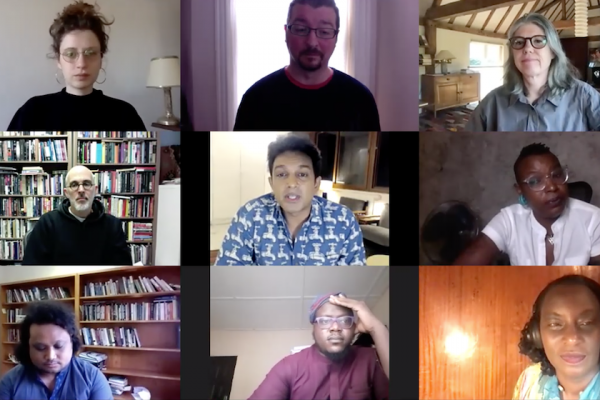Ancestors opens and closes with stories by authors who are now ancestors and each, in its own way, blasts the reader into the heavens. We could think of no better place to start than with a story that describes the birth of an ancestor: in Binyavanga Wainaina’s (1971–2019) recently rediscovered “Binguni!,” we are led through a psychedelic fantasia of the African afterlife which reassures that death is only a beginning. And then Izumi Suzuki’s (1949–1986) newly translated “Night Picnic” concludes Ancestors in a distant future in which the characters ask—and are at a loss to answer—the question: What does it mean to be human?
Toni Morrison suggests that a defining characteristic of African American literature is what she calls “the presence of an ancestor.”
When we first began imagining Ancestors, the second annual Arts in Society anthology, Toni Morrison had recently died and we’d been rereading her essay “Rootedness: The Ancestor as Foundation” (1984). In it, she suggests that a defining characteristic of African American literature is what she calls “the presence of an ancestor.” And for Morrison, the ancestral presence leads directly to “the community . . . an implied ‘we’ . . . which is to say, yes, the work must be political.”
We were so struck by this formulation—and its intrinsic challenge—that we wanted to see what would happen if we asked some of the most talented writers we know (including our contest entrants): What does it look like if you summon the presence of the ancestors into your art?
The result is what you hold in your hands. The answers we received were diverse and exciting beyond our wildest imaginings, but we feel certain that readers will take from the book an enriched sense of what it means to be a human living in a time, among other times, and to be part of a lineage, among other lineages, to have questions inherited from the past—as well as other “beyonds”—that shape our lives and will, no doubt, continue to shape the future on which we leave our impress.
The book is divided into three sections, “Origins,” “Ruptures & Transformations,” and “Onward,” which reflect our sense of how these pieces speak to our deepest beginnings, to how the tragedies of the past shape us, and to how we carry the mantle of the ancestors forward.
What does it look like if you summon the presence of the ancestors into your art?
When we started this project, we could never have imagined that it would conclude in the midst of a world-historic pandemic that has left millions dead and millions more gutted by loss. It sometimes feels it’s impossible to think of anything else—like Prospero’s famous utterance, “Every third thought shall be my grave.”
But we hope that this book will serve as a summoning spell for readers, invoking ancestral wisdom—which for Morrison meant engaged awareness of each other—to guide us all into and through whatever comes next.








